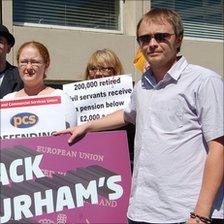Public sector strike: 'Why I am taking part'
- Published
More than one million public sector workers in England are set to strike over pension changes which the government says are fair and necessary because of the "rising cost" of their provision.
Some workers explain why they are going on strike.
Probation officer Tania Bassett, 34

Tania Bassett is concerned about the long-term effects of pension cuts
Tania Bassett has been a probation officer for nine years, and is chairman of the West Mercia branch of its trade union body Napo.
She said she was concerned that she and other staff members would "work longer, pay more, and get less at the end of it".
"The main reason I'll be on strike is that the government is making cuts which will have a significant impact on the Local Government Pension Scheme," she said.
"Personally it will mean I will pay £570 a year extra in contributions - but this won't go into my pension, it will go towards the government deficit."
Ms Bassett, of Worcester, said she was concerned about the "massive impact" the changes could have long-term.
"I think the real pension crisis is the millions of people who do not have adequate pension provision and who face financial instability in old age. The government should be trying to create fair pensions for everyone, rather than bring us all down to the lowest level of poverty," she said.
She believes that although changes may save the government money, in the long-term they will lead to "billions of pounds" being claimed in benefits by people with inadequate pensions.
Ms Bassett believes the government's underlying goal is to sell off parts of the public sector.
"My greatest concern is that by rubbishing our pensions, the government is trying to make the public sector more appetising to the private sector. I'm concerned it wants to massacre the public sector as it's a ball and chain around its neck."
Civil servant Jeff McGough, 33

Jeff McGough at a previous demonstration
Jeff McGough, 33, a married father of two young sons, works for the Identity and Passport Service (IPS).
He is secretary for the Public and Commercial Services Union (IPS Northern branch) and speaks in his capacity as a union representative.
He joined the civil service pension scheme when he started the job nine years ago.
He said his pension contributions would double under the planned changes, while he was expected to work for eight years longer for a reduced pension.
"I'll be left with substantially less, it could be tens of thousands of pounds over the years, " he said.
"It's not fair. It's a lot less than what I signed up for, and I do feel aggrieved.
"My pension would only be about £4,000 a year anyway, so we are not talking about large amounts. But I'm expecting to lose 20% to 40% of that."
'Make or break'
Mr McGough fears any cuts would not be the end of the story.
"If there is further economic decline, Mr Osborne may be back in a couple of years to take more from us," he said.
He said he and other civil servants "felt angry" because they were always led to believe that a guaranteed pension was part of a "trade-off" for getting lower wages.
Mr McGough said his wife, a local government employee, had also seen cuts and they worried about being able to pay for their children's future education.
He said the proposed changes for IPS workers came on top of a two-year pay freeze and several years of below-inflation pay rises.
"We're hard working, working class people and we just can't take any more hits," he said.
"I think it's make or break time in terms of our living standards."
Teachers Lucy Johnson, 24 and Julia Neal, 55

Lucy Johnson said the government did not value teachers enough
Lucy Johnson, 24, teaches history at a state comprehensive school in Wiltshire.
"Very many young teachers, such as myself, will opt out of the pension scheme if the contributions rise. Many already find the cost of them prohibitive on a starting salary of just over £21,000," she said.
"Last year, in my newly-qualified year, I was left with £60 spending money a week after bills, pension and rent, which made travel, saving money and buying items such as clothing very difficult indeed."
She said the government's approach was "unnecessary and unfair" because the National Audit Office had found the teachers' pension fund was solvent and teachers had already agreed to the restructuring of their pension scheme in 2007.
"I am going on strike because the teachers' pension scheme is affordable, and I believe that it is an ideologically-motivated broad-brush attack on public sector pensions - rather than a specific and factually-based reform - that the government is pushing forward."
Ms Johnson added: "I love teaching, teaching is my passion. I don't regret teaching, I regret that we are insufficiently appreciated and valued by the government, and by some parts of the general population as well."
Pensions 'plundered'
Like Ms Johnson, fifty-five year-old Julia Neal is a member of the Association of Teachers and Lecturers (ATL).

Julia Neal said striking was a last resort for teachers
Ms Neal said under the proposed changes she would pay about £120 extra in pension contributions a month after already suffering a pay freeze.
Ms Neal, a teacher since 1978, said most of her contributions would be protected but she was upset that "the government was plundering teachers' pensions and those of public servants".
She added that their pensions had already been cut by about 15% because increases were linked to the consumer prices index rather than the retail price index.
"People are facing significant increases in their contributions and that's just wrong," she said.
"I'm not campaigning for me, I'm campaigning for the profession and education. Such pension changes will put people off joining the profession and it will be future generations of children who will suffer."
NHS physiotherapist Mike Pearson, 34

Mike Pearson said the NHS pension scheme was affordable
Mike Pearson is a physiotherapist who works with elderly patients at the Nottingham University Hospitals NHS Trust.
He said: "I will be going on strike for the first time on Wednesday. I work hard helping to rehabilitate people, and am on what a relatively poor wage compared to those in the private sector.
"My NHS pension, which is reasonable but at around £7,000 a year is hardly gold-plated as some people seem to think, is part of my remuneration.
"Too many private employers are walking away from decent staff pension schemes which are leaving people in poverty in retirement."
Mr Pearson said pension changes were not the solution because in time the government would "foot the bill through benefits".
"We cannot let that happen to public sector workers too, especially when we have a pension that is still viable and has safeguards built in."
Mr Pearson said the scheme was not only affordable, it made the treasury £2bn a year.
"I am being expected to pay an extra £850 a year in pension contributions and I will be required to work until I am 68 in a physically demanding job which is likely to be impossible.
"Many physiotherapists suffer with arthritis in their hands due to manual techniques used and for those of us rehabilitating weak and heavy patients we need to be fit and agile enough to treat patients safely."
He called for the government to "properly negotiate" over the proposals.

Mrs Phillips did not take part in strikes as a civilian worker for the police
Lynda Phillips, 61, is against the strikes. She worked as a civil servant for 10 years but did not take part in previous one-day strikes over pension changes, despite being in a union.
She said although changes were being made to her pension, she felt that had to accept such changes as they were "affecting everyone".
'Duty of care'
Mrs Phillips, who had a frontline civilian job with Staffordshire Police, said: "I found I couldn't do anything that would put a police officer in harm's way or hurt the general public in any way, it wasn't me," she said.
Mrs Phillips, who retired through ill health, said the whole pensions system needed to be reformed.
"I don't think public sector workers should go on strike, instead they should sit down with the government and negotiate the best deal possible.
"People are living longer and - look at the overall state of the country, we can't go on like it is."
She added: "I think these workers have a duty of care to look after people in their organisations.
"Teachers have a duty of care to look after their pupils, NHS staff to look after their patients at home and in hospital and airline workers need to take care of their passengers."
- Published10 September 2012
- Published21 November 2011